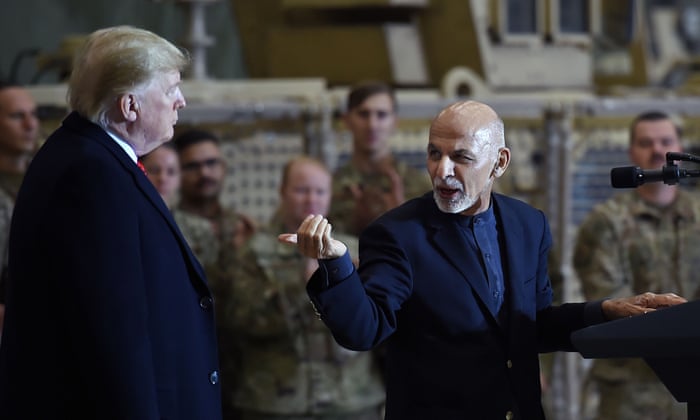A Brief Colonial History Of Ceylon(SriLanka)
Sri Lanka: One Island Two Nations
A Brief Colonial History Of Ceylon(SriLanka)
Sri Lanka: One Island Two Nations
(Full Story)
Search This Blog
Back to 500BC.
==========================
Thiranjala Weerasinghe sj.- One Island Two Nations
?????????????????????????????????????????????????Saturday, November 30, 2019
Afghanistan’s road to peace still full of obstacles
Trump claims US-Taliban talks are back on but it is unclear if key disputes have been settled Ashraf
Ghani, the Afghan president, addresses Donald Trump at Bagram airfield
during a surprise visit on Thanksgiving. Photograph: AFP /Getty
Ashraf
Ghani, the Afghan president, addresses Donald Trump at Bagram airfield
during a surprise visit on Thanksgiving. Photograph: AFP /GettyEmma Graham-Harrison-
 Donald Trump says talks with the Taliban are back on but
it is unclear if the disputes that hobbled the last attempt to reach a
peace deal – cancelled by a presidential tweet in September – have been
resolved.
Donald Trump says talks with the Taliban are back on but
it is unclear if the disputes that hobbled the last attempt to reach a
peace deal – cancelled by a presidential tweet in September – have been
resolved.The insurgent group responded to Trump by telling Agence France-Presse it was “way too early” to discuss resuming direct talks.
A recent hostage release, of an American and an Australian who had been held for three years, suggested the Taliban were still keen to find a negotiated end to the war.
“I have the impression that the contacts were never fully cut off,” said Thomas Ruttig, the co-director of the Kabul-based Afghanistan Analysts Network.
“The message from the Americans was: the Taliban need to give a few more concessions, and the prisoners/hostages swap … was discussed in this context. So the release was a sign of the Taliban’s interest to start talking again.”
In return for the hostages’ freedom, the Afghan government released several senior Taliban members it was holding prisoner. That was widely seen as an attempt by the Kabul government to move closer to the heart of any attempts to reach a settlement.
The Taliban have long insisted they will speak only to the US because they consider the Kabul government a “puppet regime”. Any peace deal with Washington is expected to pave the ground for wider inter-Afghan negotiations.
Talks with the US were “the only way Afghans can get to direct Taliban-Kabul peace talks, as long as the Taliban reject talking with Kabul before an agreement with the US”, Ruttig said.
But adding to uncertainty, Afghanistan is also in political limbo awaiting the results of the presidential election on 28 September, in which the incumbent, Ashraf Ghani, faced one main rival, Abdullah Abdullah. Two months later the winner is yet to be announced as disputes over the counting delay the release of results.
The brief tour to see troops serving in the US’s longest war was Trump’s first time in the country, and second trip to forces in a war zone, after a similar visit to Iraq.
In comments likely to please Ghani, the US president said the Taliban needed to agree a temporary halt to fighting as a condition for negotiations. That has long been a demand of the Kabul administration.
“We’re meeting with them and we’re saying it has to be a ceasefire,” Trump said. In a break with precedent, Trump also invited Ghani to address the troops.
Demands for a halt in fighting has always been a sticking point for the insurgents, as violence gives them leverage in a country where they do not hold other levers of power.
Both sides are likely to have followed closely Trump’s abrupt decision to abandon key allies in northern Syria two months ago, declaring the war against Islamic State over and allowing Turkey to move in.
The move was widely criticised and has since been partially reversed but was taken as a sign of Trump’s distaste for keeping US troops serving abroad and his willingness to defy allies and advisers when he makes a decision.
